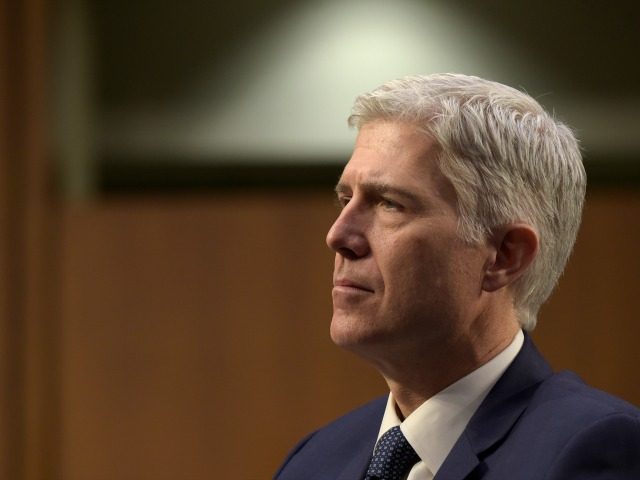Tuesday’s Supreme Court’s Oil States decision showcases Justice Neil Gorsuch as contemplating a major judicial role in limiting government power, perhaps providing a glimpse of where conservatives could take the Constitution in years ahead.
Oil States was a fight over patent rights. Oil States Energy Services obtained a patent for hydraulic fracking equipment, and sued Greene’s Energy Group, alleging patent infringement. Green’s Energy defended by challenging the validity of Oil States Energy’s patent, and Oil States Energy countered that only a federal court with a jury could strip away its patent.
Under federal patent law, the U.S. Patent and Trademark Office (PTO) can revoke patents under certain circumstances. Critics have argued that because a patent becomes the property of its owner, only a federal court created by Article III of the Constitution can decide such a challenge, and the Constitution’s Seventh Amendment guarantees the patent holder a jury trial in that federal proceeding.
Lower courts have ruled in favor of PTO’s authority, and the Supreme Court has repeatedly refused to take up the issue – until now. The justices decided to hear the matter. In a 7-2 decision written by the uncompromisingly conservative Justice Clarence Thomas, the Court ruled in favor of PTO. Thomas wrote that patent protections were a “public right” granted by government, and thus different from pure private-property rights.
Justice Neil Gorsuch dissented, joined by Chief Justice John Roberts. Gorsuch talked about the little guy who, after years of trying, realizes the American dream by coming up with a neat little invention off which he can make some money. Then someone tries to take away this hard-earned invention.
“Can a political appointee and his administrative agents, instead of an independent judge, resolve the dispute?” Gorsuch asks. “The Court says yes. Respectfully, I disagree.”
“Powerful interests are capable of amassing armies of lobbyists and lawyers to influence (and even capture) politically accountable bureaucracies,” Gorsuch observes. “But what about everyone else?”
Coupled with last week’s Dimaya case where Gorsuch ruled against the Trump administration in a case involving deporting legal immigrants (not illegal aliens, as was widely but falsely reported), a picture emerges of Gorsuch as a jurist who sees a judge’s job as enforcing the constitutional line between the individual and the power of the government. In other words, Gorsuch is opposed to the vast bureaucracy of the administrative state.
Gorsuch may appear to be a minority of only one or two today, but that may not always be the case. Perhaps the last time such a minority became a Supreme Court majority was Chief Justice William Rehnquist.
The Constitution’s Commerce Clause grants Congress power to regulate interstate commerce, which the Court in the 1940s and 1960s reinterpreted to cover virtually every human activity. When Rehnquist joined the Court in 1972 at page 47 (Gorsuch joined at age 49), he was a lone voice on meaningful limits on Commerce Clause power—that it is about actual commerce where money is exchanged, and where aspects of that commerce relates to state lines.
Rehnquist’s lone voice in the wilderness became a minority, then a plurality, then in 1995 the Court by a 5-4 vote in United States v. Lopez struck down a federal law for violating the Commerce Clause. The Court did so again by a vote 5-4 vote in 2000, imposing modest but real limits on federal power.
Senator Ted Cruz mentions how during his 1997 clerkship with Rehnquist, he and his fellow law clerks were always on the lookout for the “next Lopez.” It was a decades-long campaign for Rehnquist, one where he made great strides.
Some justices have such a long-term vision. The unshakably principled Justice Thomas is of that view, who when once asked why he is sometimes the lone dissent in an 8-1 decision, said that he believes you need to call the law as you see it, even though that view may not prevail for a generation.
When told it would take a long time to go from 8-1 to a majority on the Supreme Court, Thomas smiles and says, “It took Harlan 60 years, but he finally won,” a reference to Justice John Harlan’s lone dissent against “separate but equal” in Plessy v. Ferguson in 1896, which became a majority when the Court rejected racial school segregation in Brown v. Board of Education in 1954.
Gorsuch may follow in the steps of Rehnquist, one focused on reining in the power of the administrative state. It may take years, but the young Gorsuch may have time to build his majority.
That goes for lawyers, too. Conventional thought in D.C. was that Oil States would be a 9-0 decision. The justices surprised many Court watchers when they announced in June 2017 that they would hear this case at all, which was argued in November.
Making court decisions requires more than the judges on the bench; it also requires the lawyers who bring the cases, file the briefs, and argue them.
Enter Allyson Ho, who argued Oil States. Younger than many Supreme Court attorneys – a field which is also dominated by men – Ho is among the top private-sector women in the number of cases she has argued before the nation’s highest court. After years of rejecting petitions to hear these constitutional issues, the justices picked a lawyer who they thought could make the best case for them. She picked up two votes that pundits thought unreachable.
Oil States highlights a judicial view that fulfills President Trump’s promise to the American people, one that deconstructs the administrative state. With these exact issues or countless others, time will tell whether a Supreme Court majority emerges to reconsider decades of precedent with a skeptical eye toward government power.
The case is Oil States Energy Services v. Greene’s Energy Group, No. 16-712 at the U.S. Supreme Court.
Ken Klukowski is senior legal editor for Breitbart News. Follow him on Twitter @kenklukowski.

COMMENTS
Please let us know if you're having issues with commenting.